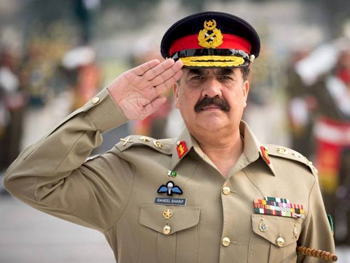Islamabad, Oct 16: A proposal to elevate Pakistan's Army chief General Raheel Sharif to the rank of Field Marshal has reached the Islamabad High Court, weeks ahead of his retirement from the powerful post.
 A lawyer has sought the high court's help to elevate Gen Raheel, 60, to the rank of Field Marshal in the greater national interest by taking into consideration his "exemplary services and sacrifices rendered for the nation," The Express Tribune reported today.
A lawyer has sought the high court's help to elevate Gen Raheel, 60, to the rank of Field Marshal in the greater national interest by taking into consideration his "exemplary services and sacrifices rendered for the nation," The Express Tribune reported today.
In the appeal submitted yesterday, Sardar Adnan Saleem, through his counsel, said that such an elevation is an emergent need in the present circumstances.
Saleem has made the federation through the cabinet division secretary, the prime minister through the secretary of the PM Secretariat and defence ministry secretary respondents in the petition, the report said.
The counsel said that the army chief should be promoted to the rank of Field Marshal for rendering services to protect national security and safeguarding the frontiers of Pakistan in accordance with the National Action Plan (NAP) and for successful completion of the anti-terror campaign 'Zarb-e- Azab' in an effective and efficient manner.
Gen Sharif had earlier promised to bow out at the end of his term in November this year.
Sharif, currently serving as the 15th Chief of Army Staff of the Pakistan Army, was appointed by Prime Minister Nawaz Sharif on November 29, 2013 for a three-year term.
"I don't believe in extension and will retire on the due date," Sharif had said in January this year amidst growing speculation about an extension in his tenure.
If Sharif hangs up his boots on November 30, he would be the first army chief to retire on time in two decades. His predecessors Gen Ashfaq Parvez Kayani and Gen Pervez Musharraf got extensions, while Gen Jehangir Karamat was sent home prematurely.
While calling him a "trailblazer", the petitioner's lawyers said that Gen Raheel provided visionary leadership to the people as well as the security forces.
"The exemplary, outstanding and professional performance during peace and war time with total dedication and devotion by attaining the highest standards and mastery in battlefield," he said adding that the COAS needs national appreciation, award and recognition.
The petition said that the COAS should be elevated to the highest level of military hierarchy for rendering his services for the nation and humanity at a larger scale in an extraordinary, exemplary and selfless manner.
The petition has urged the court to direct the respondents to elevate Gen Raheel to the rank of field marshal for leading from the front on different fronts.





Comments
Add new comment